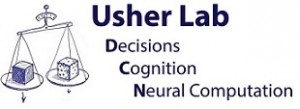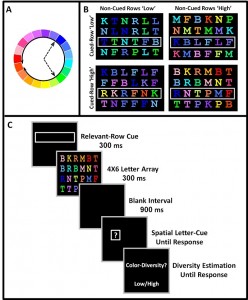Consciousness
Consciousness may be the holy-grail of cognitive science research. While until a decade ago this was the exclusive domain of philosophers, now-days, a wide array of interdisciplinary methods are being used to understand the properties of consciousness and neural mechanisms underlying it. A recent debate involves the distinction between two models of consciousness: Access vs Phenomenal. According to proponents of this distinction we have rich phenomenal experience outside the attentional spotlight (OVERFLOW position), while according to its critics experience outside the focus of attention is very sparse. In our work we provided support for the presence of detailed visual content outside the focus of attention. For example, we demonstrated that observers can discriminate complex statistical properties at unattended locations, and we used neural computational principles to infer a reliable, yet transient conscious representation of this visual information, which decays before it can be encoded in working-memory and then reported.
Figure 1: A) the method used for creating two color-diversity levels. The 'High' diversity sampling range was the entire color spectrum (solid black line), while the 'Low' diversity sampling range was a subset of 6 adjacent colors which rotated between trials (dashed line). B) examples of possible color-diversity combinations between the cued-row and the non-cued rows; C) schematic illustration of a single experimental trial (from Bronfman Z, Brezis N, Jacobson H & Usher M(2014). We See More Than We Can Report: ''Cost Free'' Color Phenomenality Outside Focal Attention, Psychological Science.)
Two theoretical papers that address philosophical issues on the Phenomenal-Access distions and which support the Overflow positions are the following:
Bronfman Z, Jacobson H & Usher M (2018). Impoverished or rich consciousness outside attentional focus: Recent data tip the balance for Overflow. Mind & Language, 34:423–444.
Agency, Free-Will and Moral-Responsibility
Does neuroscience undermine our role as agents that are responsible for the effect of our actions? A negative answer to this question, as well as an attempt to explain in what way, we (as agents who do things) are special (and different) from mere objects that move around (see also M. U. personal website), is given in these papers: (מחפשים מבוגר אחראי: Hebrew from the Odyssey); Control, choice and the convergence / divergence dynamics: a compatibilistic probabilistic theory of free will. Journal of Philosophy.
A more recent paper that presents a Compatibilstic solution to agency and moral responsibility, which relies on the notion of robust-causation to ground agency and responsibility:
Marius Usher (2018). Agency, Teleological Control and Robust Causation. Philosophy and Phenomenological Research (in press)

